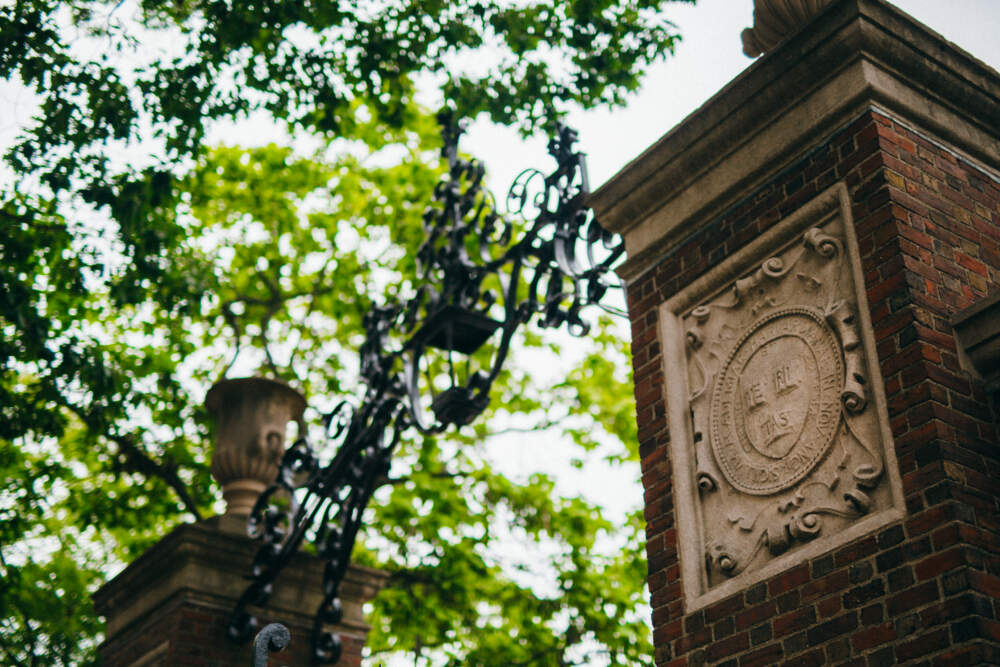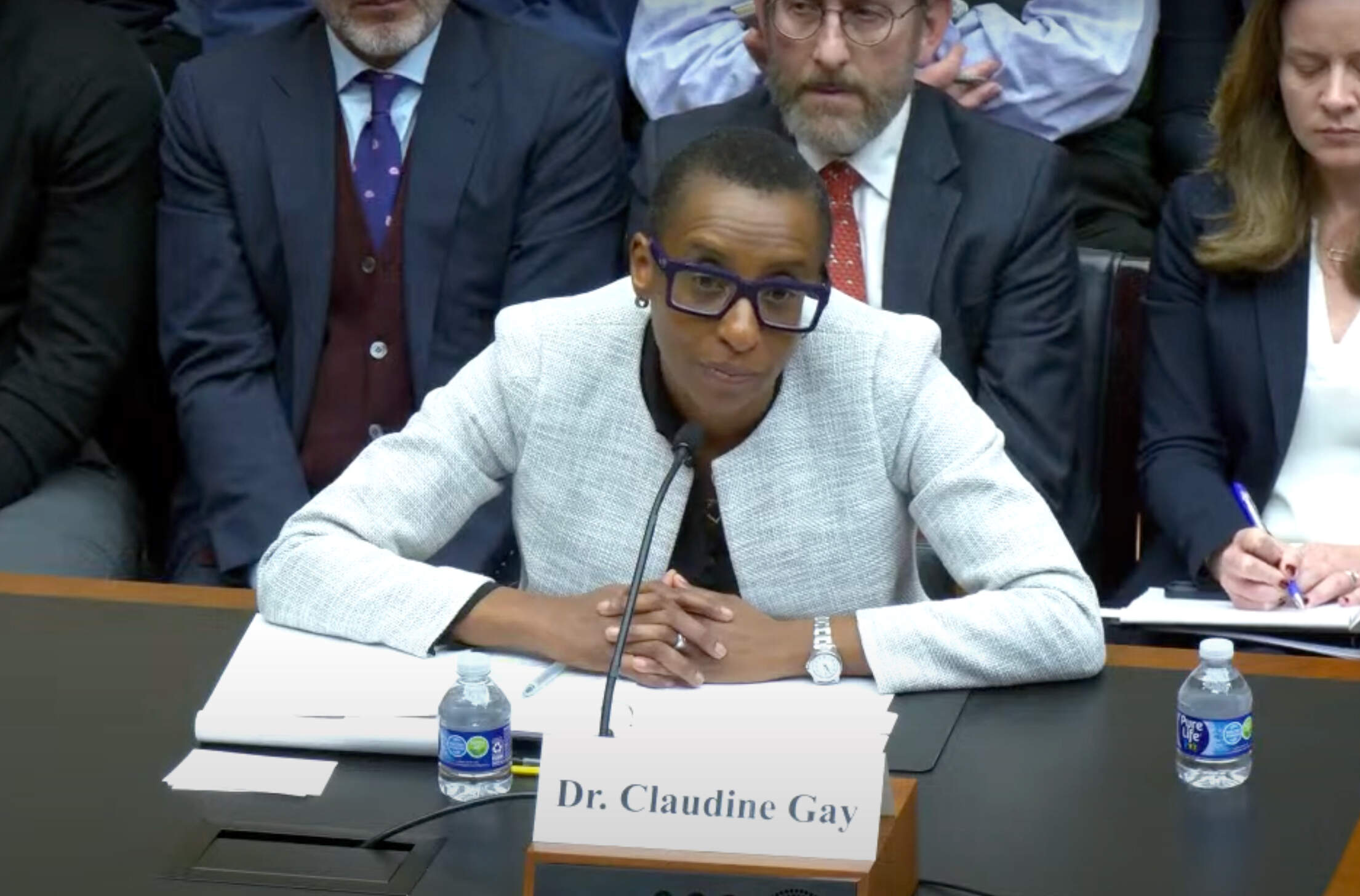Advertisement
Harvard’s president faces backlash following House antisemitism hearing

In 72 hours, Harvard President Claudine Gay went from testifying on Capitol Hill alongside two other prominent university presidents about campus antisemitism to issuing an apology to facing a whirlwind of public outcry.
The controversy stems from Gay’s comments at a congressional hearing Tuesday, during an exchange with a Republican lawmaker who asked whether “calling for the genocide of Jews” constitutes harassment or punishable speech.
Asked if that kind of rhetoric violates Harvard’s rules of bullying and harassment, Gay said, “it can be, depending on the context.” Repeatedly asked by Rep. Elise Stefanik to provide a yes-or-no answer, Gay demurred.

That response sparked shock and disappointment among a number of Jewish students, alumni and faith leaders. On Thursday, a prominent rabbi resigned from a university task force on antisemitism, while Gay issued an apology in an interview with Harvard’s student newspaper.
On Friday, more than 70 members of Congress, largely Republican, signed a letter to Harvard’s governing board calling for Gay’s resignation, according to the Harvard Crimson.
The turn of events reveals the mounting peril Harvard leadership has faced in charting a middle path between protecting free speech and promoting safety on campus since the Israel-Hamas war began on Oct. 7.
The exchange at issue came during an hours-long hearing Tuesday with the presidents of Harvard, MIT and University of Pennsylvania before the House Committee on Education and Workforce on how campus leaders have responded to reports of antisemitism stemming from mostly pro-Palestinian rallies and protests.
The comments occurred during a tense exchange with Stefanik, the fourth-ranking House Republican and a staunch ally of former President Donald Trump.
Stefanik asked Gay and the two other presidents about a common pro-Palestinian chant calling for “intifada,” which for many conjures past violence against Israeli civilians.
Stefanik argued that the term — which literally means “shaking off” or “uprising” in Arabic — is “a call for violent armed resistance against the state of Israel… and the genocide of Jews.”
Gay condemned the use of the term “intifada” as “thoughtless, reckless, and hateful,” — echoing her earlier stand against the chant “from the river to the sea.”
But when asked if that kind of rhetoric against Jews was acceptable under Harvard’s code of conduct, Gay said it “depends on the context.” When pressed, Gay added, “antisemitic rhetoric when it crosses into conduct that amounts to bullying, harassment, intimidation — that is actionable conduct and we do take action.”
Advertisement
An irate Stefanik — a 2006 Harvard alumna — promptly repeated her earlier call for Gay’s resignation.
Presidents Liz Magill of UPenn and Sally Kornbluth of MIT provided similar answers to Stefanik’s line of questioning, and both have also faced calls to resign in the last 48 hours – particularly Magill.
The viral exchange with Gay and the other presidents led to swift rebukes from both sides of the political aisle. The list ranges from Douglas Emhoff, the U.S. second gentleman, and Massachusetts’ congressional delegation, to prominent donors and others tied to the universities.
In a public statement Wednesday, and then again to The Harvard Crimson Thursday, Gay sought to clarify her position — and to apologize.
“I got caught up in what had become at that point, an extended, combative exchange about policies and procedures,” Gay told the Crimson.
“What I should have had the presence of mind to do in that moment was return to my guiding truth, which is that calls for violence against our Jewish community … have no place at Harvard, and will never go unchallenged,” she added.
In Cambridge, many expressed grave disappointment.
In a newsletter sent Tuesday night, Harvard Hillel leaders Rabbi Getzel Davis and junior Jacob Miller wrote that they were “appalled by the need to state the obvious: a call for genocide against Jews is always a hateful incitement of violence.”
Gay’s answer, they added, “calls into question her ability to protect Jewish students on Harvard’s campus.”
Harvard students have spoken out about rising antisemitism on the campus since the Israel-Hamas conflict began and have expressed frustration with the university’s response.
Gay assumed the role in July, and joined her fellow panelists Tuesday — all relatively new presidents at elite institutions and all three women. From the start of the Middle East conflict, Gay has faced criticism for a condemnation of the Oct. 7 attacks on Israel by Hamas that many saw as tepid and delayed.
On Thursday, Rabbi David Wolpe, a visiting scholar at Harvard Divinity School , resigned from a Harvard task force on antisemitism Gay convened in recent weeks. In a post on X, formerly Twitter, Wolpe defended Gay’s character but cited her “painfully inadequate testimony” as one influence on his decision.
Wolpe wrote “both events on campus and the painfully inadequate testimony reinforced the idea that I cannot make the sort of difference I had hoped” serving on the task force.
Meanwhile, billionaire hedge fund manager Bill Ackman, a Harvard alumnus, implied on X that Gay — the daughter of Haitian immigrants and the first person of color to lead Harvard in nearly 400 years of history — got the job on the basis of her identity.
Some prominent voices, including Ibram X. Kendi, the head of Boston University’s Center for Antiracist Research, called out Ackman’s and similar claims as “racist and sexist.”
Students respond
Meanwhile, pro-Palestinian students and staff on Harvard’s campus described Stefanik’s combative line of questioning as effective — but destructive — political theater.
In an interview, Harvard senior Guillermo S. Hava said that “calls for genocidal violence” should be forbidden on campus, but that the chant in question during the Congressional hearing doesn’t meet that definition.
While phrases like “intifada” or “from the river to the sea,” “may be controversial [or] offensive to some,” Hava said, “they’re certainly not inherently genocidal.”
Still, the university presidents who testified Tuesday have not managed to quell the resulting outrage — despite public statements walking back their remarks. If anything, it has intensified.
On Thursday, the House Committee on Education and the Workforce said it was launching an investigation into disciplinary procedures concerning antisemitism at all three schools.
In a statement Friday, a Harvard spokesman said university staff “look forward to sharing information with the Committee as it pursues its inquiry.”
Meanwhile, a single-engine Cessna plane flew over Harvard’s campus Thursday and Friday, trailing a Palestinian flag and banner that reads “Harvard hates Jews.” It is not clear who paid for the stunt.

